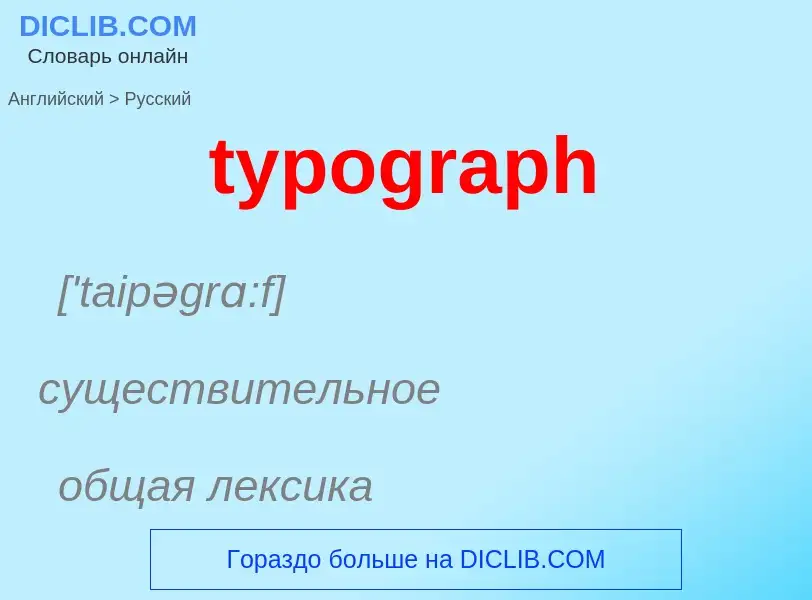Перевод и анализ слов искусственным интеллектом ChatGPT
На этой странице Вы можете получить подробный анализ слова или словосочетания, произведенный с помощью лучшей на сегодняшний день технологии искусственного интеллекта:
- как употребляется слово
- частота употребления
- используется оно чаще в устной или письменной речи
- варианты перевода слова
- примеры употребления (несколько фраз с переводом)
- этимология
typograph - перевод на русский
['taipəgrɑ:f]
существительное
общая лексика
печатник
пишущая машинка для слепых
Определение
Википедия
Typography is the art and technique of arranging type to make written language legible, readable and appealing when displayed. The arrangement of type involves selecting typefaces, point sizes, line lengths, line-spacing (leading), and letter-spacing (tracking), as well as adjusting the space between pairs of letters (kerning). The term typography is also applied to the style, arrangement, and appearance of the letters, numbers, and symbols created by the process. Type design is a closely related craft, sometimes considered part of typography; most typographers do not design typefaces, and some type designers do not consider themselves typographers. Typography also may be used as an ornamental and decorative device, unrelated to the communication of information.
Typography is the work of typesetters (also known as compositors), typographers, graphic designers, art directors, manga artists, comic book artists, and, now, anyone who arranges words, letters, numbers, and symbols for publication, display, or distribution, from clerical workers and newsletter writers to anyone self-publishing materials. Until the Digital Age, typography was a specialized occupation. Digitization opened up typography to new generations of previously unrelated designers and lay users. As the capability to create typography has become ubiquitous, the application of principles and best practices developed over generations of skilled workers and professionals has diminished. Thus, at a time when scientific techniques can provide evidence that supports established practice (legibility or brand recognition achieved through the appropriate use of serifs, letter case, letter forms, contrast, spacing, etc.) through understanding the limitations of human vision, typography may be encountered that fails to achieve its principal objective: effective communication.

![A specimen sheet by [[William Caslon]] shows printed examples of Roman typefaces. A specimen sheet by [[William Caslon]] shows printed examples of Roman typefaces.](https://commons.wikimedia.org/wiki/Special:FilePath/A Specimen by William Caslon.jpg?width=200)
![Wang Zhen]] Wang Zhen]]](https://commons.wikimedia.org/wiki/Special:FilePath/Chinese movable type 1313-ce.png?width=200)
![Korean movable type from 1377 used for the [[Jikji]] Korean movable type from 1377 used for the [[Jikji]]](https://commons.wikimedia.org/wiki/Special:FilePath/JikjiType.gif?width=200)
![Nineteenth century wanted poster for [[John Wilkes Booth]] (the assassin of U.S. President [[Abraham Lincoln]]) printed with lead and woodcut type, and incorporating photography Nineteenth century wanted poster for [[John Wilkes Booth]] (the assassin of U.S. President [[Abraham Lincoln]]) printed with lead and woodcut type, and incorporating photography](https://commons.wikimedia.org/wiki/Special:FilePath/John Wilkes Booth wanted poster new.jpg?width=200)
![tracking]] using an extract of an essay by [[Oscar Wilde]] ''The English Renaissance of Art'' {{circa}} 1882 tracking]] using an extract of an essay by [[Oscar Wilde]] ''The English Renaissance of Art'' {{circa}} 1882](https://commons.wikimedia.org/wiki/Special:FilePath/Oscar wilde english renaissance of art 2.png?width=200)

![John Shaw]] John Shaw]]](https://commons.wikimedia.org/wiki/Special:FilePath/Rydal Mount Plaque - geograph.org.uk - 895220.jpg?width=200)
